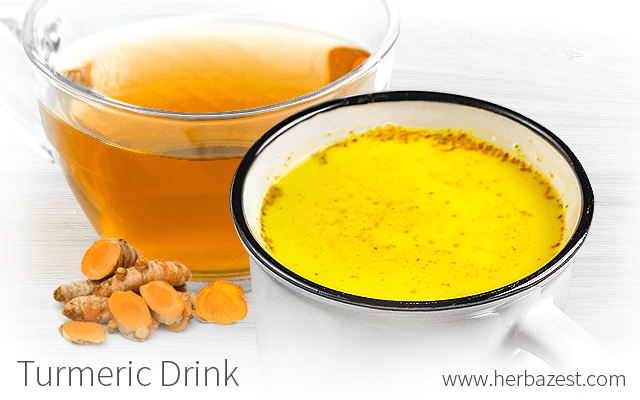Turmeric has been long praised across southern Asia and used in the treatment of worms, digestive issues, leprosy, jaundice, diabetes, and infertility. Today, remnants of that same enthusiasm can be found in modern-day turmeric preparations. With many ancient practices having been validated through modern research, it is now clear that turmeric drink benefits are plentiful, further explaining popular traditions.
Turmeric Drink for Energy
Power through a busy day with a frozen smoothie or other blended turmeric drink. The basic steps are as follows:
- Carefully wash and chop one small, finger-sized piece of fresh, raw turmeric. Its skin provides a few extra nutrients.
- Combine turmeric with 1/2 cup of milk and three cups of assorted fresh fruits and vegetables. Strawberries, spinach, kale, pineapples, kiwis, and bananas are all delicious possibilities.
- Blend all ingredients together with ice and serve chilled.
Turmeric Drink for Skin
Beloved for its ability to heal and protect the skin, golden milk is a popular turmeric powder drink made from a combination of milk and turmeric spice. Prepare this drink for a visibly-even tone by following these easy steps:
- Add one teaspoon of turmeric powder, cinnamon, honey, and a pinch of black pepper to two cups of milk (almond milk and skim milk are both excellent alternatives to using whole milk.)
- Heat the mixture over medium heat for three minutes, blending with a small whisk.
- Reduce heat and let simmer, adding a teaspoon of coconut oil for absorption and additional spices for taste.
Turmeric Drink for Rest and Relaxation
A warm, nourishing turmeric drink can help to relieve pain and provide a restful nightcap to a long, hectic day. To prepare turmeric tea, follow these simple steps:
- First, dissolve one tablespoon of turmeric in water using a small saucepan and wooden spoon (if using fresh turmeric, chop and measure about one cup).
- Let the turmeric-water mixture come to a boil, then reduce heat and let simmer.
- Add honey, lemon, and spices to taste.
- Although typically consumed warm, this particular turmeric drink can also be chilled and served on ice.
Turmeric Drink Benefits
One of the cool things about turmeric drinks is that they are able to retain some of the major health benefits of the turmeric plant, regardless of whether they are made from the fresh root or its powder. Widely diverse and often festive, turmeric drinks are chock-full of magnesium, iron, potassium, and zinc - important nutrients that help to build strong muscles, carry oxygen throughout the body, and create energy, among other functions.
In addition, the benefits of curcumin in turmeric drinks are plentiful. In fact, the majority of turmeric drink benefits can be traced back to its curcuminoid content.
Turmeric drinks boast powerful antioxidant and anti-inflammatory activity that has placed them near the forefront of herbal home remedies for rheumatoid arthritis and joint pain, as well as for dental care, digestive ailments, and abdominal discomfort.1,2 For the treatment of diabetes, they have also been widely studied for their ability to effectively lower blood sugar levels by improving the function of insulin-producing cells.3 Other turmeric drink benefits include faster wound healing and increased protection against lead, arsenic, copper, and other potentially toxic metals.4,5
Turmeric drinks benefit the human body through a combination of unique methods, whether they be preventative, protective, or healing. With a wealth of knowledge on how to make them at home for everyday use, turmeric drinks can be easily prepared and enjoyed.
Sources
- Food as Medicine
- Herbal Medicine: Biomolecular and Clinical Aspects, Chapter 13: Turmeric, the golden spice
- National Institutes of Health, Magnesium | Iron | Potassium in diet | Zinc
- The Way of Ayurvedic Herbs, p. 196
- USDA Nutrient Database, Spices, turmeric, ground
- Journal of Agricultural and Food Chemistry, Effects of ingested turmeric oleoresin on glucose and lipid metabolisms in obese diabetic mice: a DNA microarray study, 2006
Footnotes:
- Chemical and Pharmaceutical Bulletin. (1985). Natural antioxidants. III. Antioxidative components isolated from rhizome of Curcuma longa L. Retrieved October 12, 2021, from: https://www.jstage.jst.go.jp/article/cpb1958/33/4/33_4_1725/_pdf
- Journal of Alternative and Complementary Medicine. (2009). Efficacy and safety of Curcuma domestica extracts in patients with knee osteoarthritis. Retrieved September 23, 2021, from: https://pubmed.ncbi.nlm.nih.gov/19678780/
- Journal of Agricultural and Food Chemistry. (2005). Curcuminoids and sesquiterpenoids in turmeric (Curcuma longa L.) suppress an increase in blood glucose level in type 2 diabetic KK-Ay mice. Retrieved September 23, 2021, from: https://pubs.acs.org/doi/10.1021/jf0483873
- Life Sciences. (2014). Curcumin as a wound healing agent. Retrieved October 12, 2021, from: https://pubmed.ncbi.nlm.nih.gov/25200875/
- Food and Chemical Toxicology. (2014). Protective effect of curcumin against heavy metals-induced liver damage. Retrieved October 12, 2021, from: https://pubmed.ncbi.nlm.nih.gov/24751969/




